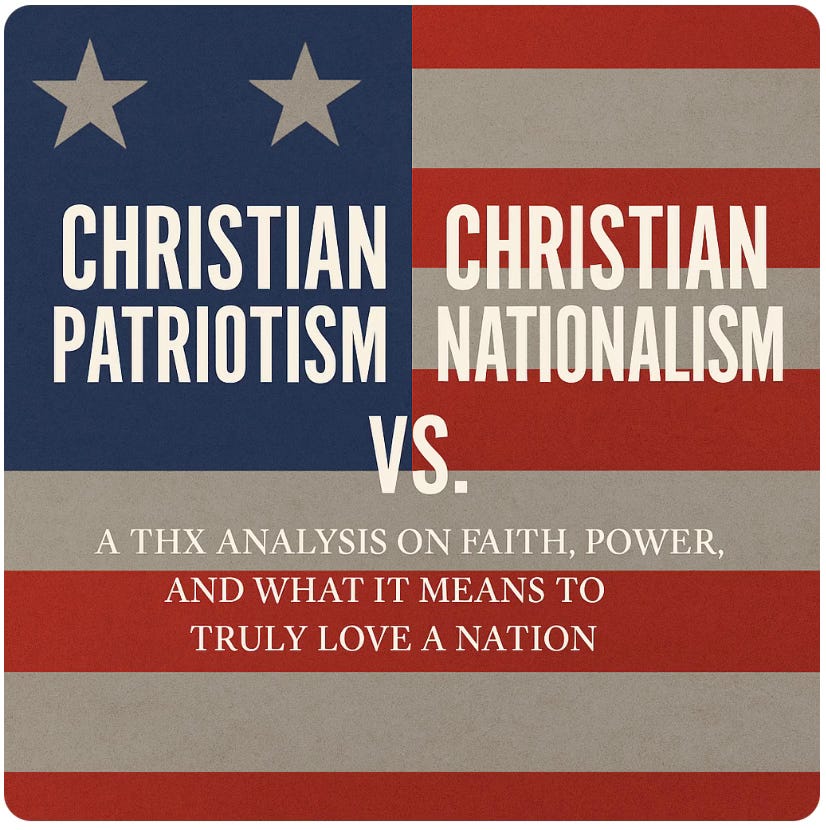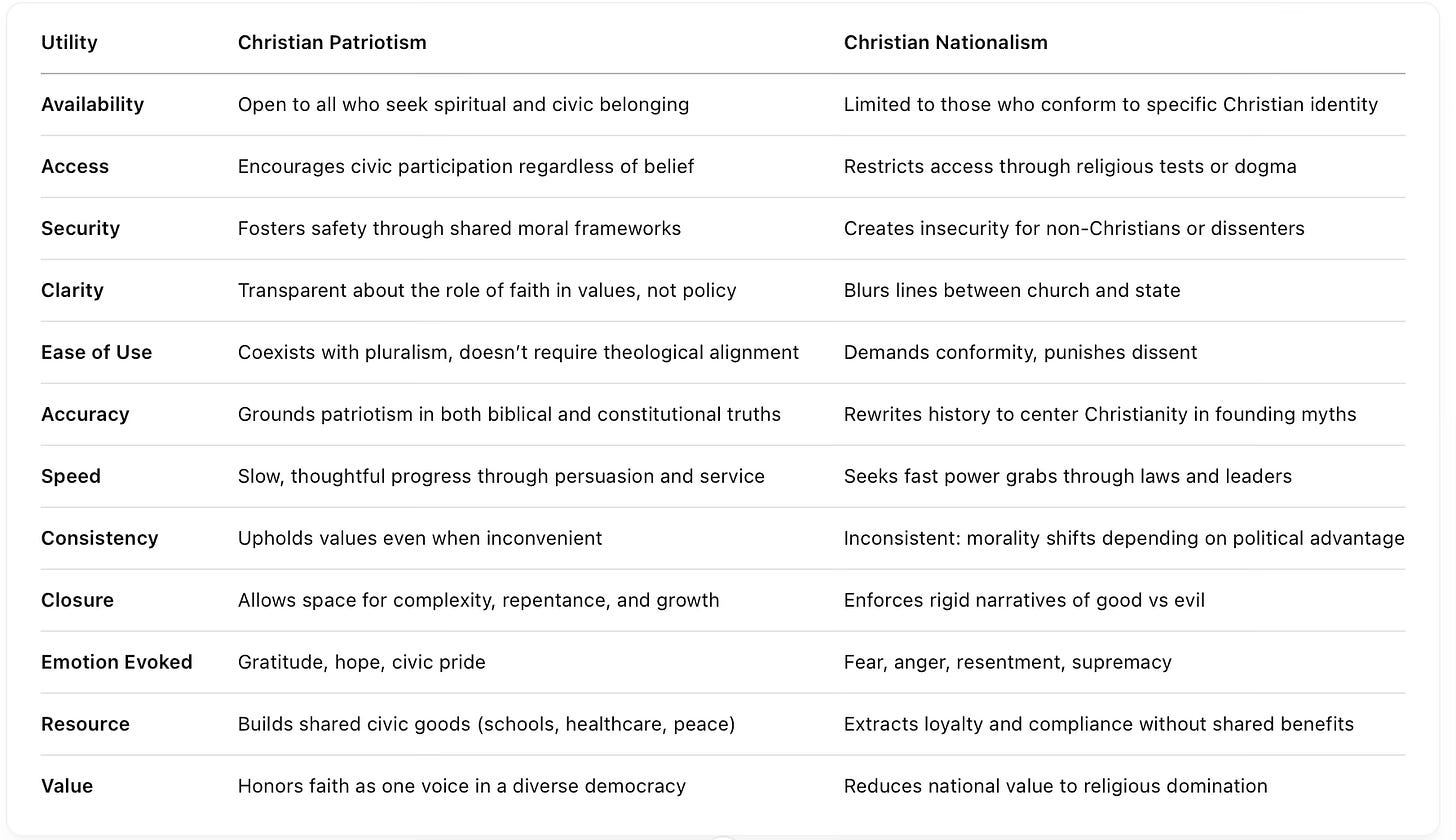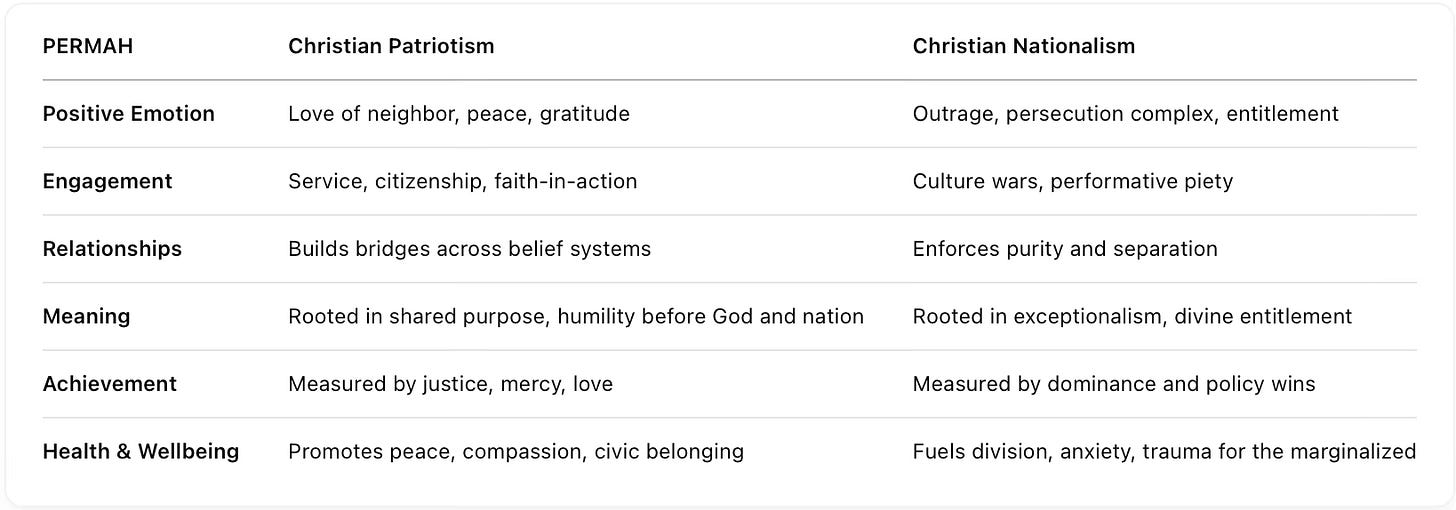Christian Patriotism vs. Christian Nationalism: A THX Analysis on Faith, Power, and What It Means to Truly Love a Nation
THX Series Hub: Christian Nationalism vs Christian Patriotism
Listen to the podcast here
There’s a quiet confusion spreading through the American church—and perhaps through our very identity as a nation.
On one hand, there are Christians who love their country, who serve with humility, who pray for leaders regardless of party, who show up with casseroles and carpools and compassion. Their patriotism is shaped by scripture, yes—but also by shared humanity. They seek justice. They value peace. They live the Beatitudes in boardrooms and ballot boxes.
On the other hand, there is something louder, more forceful, more brittle: a movement that claims the name of Christ while demanding political power, purity tests, and punishment for the "other." It waves the flag in one hand and a cross in the other—but often wields both like weapons.
The difference between Christian patriotism and Christian nationalism is not just semantic.
It’s the difference between servant leadership and spiritual supremacy.
It’s the difference between transformation and domination.
How Good Christians Get Pulled In
Here’s the hard part: many Christian nationalists started as Christian patriots.
They love their country. They feel the moral decay around them. They worry about the future for their kids and grandkids. They feel mocked by elites, ignored by policy, and squeezed by economic systems they don't control.
Enter the drift.
A charismatic pastor starts mixing scripture with conspiracy theories.
A political candidate talks more about God than Jesus—and never about grace.
Fox News airs a segment about schools banning Christmas decorations, and the heart that once sought justice now burns with grievance.
Prayer becomes a political chant. Faith becomes a loyalty test.
Suddenly, people who once volunteered at shelters or supported interfaith initiatives find themselves cheering for legislation that punishes the poor or bans books written by Jews or Muslims.
They didn’t mean to drift into nationalism.
They just got tired of feeling small.
And someone offered them the promise of feeling chosen.
The 12 Utilities: What Each Offers (or Takes Away)
Using the 12 Utilities, we can evaluate whether each path leads to human flourishing or fuels transactional loyalty, tribal control, or emotional manipulation.
From Utility to Flourishing: PERMAH in Practice
Where Christian patriotism fosters peace, engagement, meaning, and well-being, nationalism often generates anxiety, vengeance, and disconnection.
Prospect Theory: Why the Drift Is So Powerful
Prospect Theory tells us that losses hurt more than equivalent gains help. Christian nationalists frame cultural change as catastrophic loss: of tradition, of values, of moral authority.
“We’re losing our country.”
“They’re coming for our churches.”
“We’re being erased.”
These aren’t policy critiques. They’re existential fears—and fear is a powerful motivator.
Christian patriotism might celebrate gains in justice or diversity. But if someone experiences those changes as losses—of status, of certainty, of control—they may embrace extremism without realizing it.
Admiration Equation: Where Loyalty Is Built
True admiration—the kind that builds community, deepens trust, and inspires service—comes from skill, goodness, awe, and gratitude.
Christian nationalism often confuses awe with spectacle, skill with control, and gratitude with tribalism.
Patriotism invites admiration.
Nationalism demands allegiance.
Micro-Moments: What People Actually Experience
In Christian Patriotism:
You’re invited to a potluck with neighbors from different backgrounds.
A church group builds homes for non-Christian refugees.
A prayer at a public event includes a nod to pluralism.
In Christian Nationalism:
You're told you're not a "real American" unless you believe a certain way.
Public policy is shaped by one group’s theology.
Moments of awe or service are weaponized into loyalty tests.
Micro-Moments: The Daily Difference
The shift happens in tiny moments.
When a Facebook post replaces scripture with fear.
When a school board meeting turns into a prayer rally against science.
When the candidate invoking Jesus sounds more like Caesar.
These moments add up.
They either build bridges or erect walls.
Purpose Alignment
This analysis reveals that the Christian experience in the civic realm can lead to either transformational unity or transactional domination.
Christian Patriotism honors the power of the human experience to transform a nation through humility, faith, and shared purpose.
Christian Nationalism replaces transformation with control—relying on fear, exclusion, and identity politics.
A Better Path Is Still Possible
This isn’t about shame. It’s about seeing clearly.
Many people caught in the web of Christian nationalism are not evil.
They are tired.
They are scared.
They are manipulated by media and politicians who profit from outrage.
But we don’t have to stay there.
Christian patriotism calls us back—to humility, justice, mercy, and love of neighbor.
Not as slogans, but as ways of life.
We can be proud of our country without placing it above the Kingdom of God.
We can love the Constitution without rewriting the Bible to match it.
Faith That Heals, Not Harms
The future of America’s moral and civic fabric may depend on whether Christian patriots can rise up—not to take power, but to lay it down in service, compassion, and clarity.
Because the Jesus who washed feet, healed enemies, and walked toward the cross
has no interest in becoming a campaign mascot.
He’s interested in transformation.
And so are we.
Questions for Reflection
If you’re someone who loves Jesus and America, ask yourself:
Does my version of patriotism make space for others to belong—or just for me to feel secure?
Am I more outraged by the loss of tradition than the loss of compassion?
Do I admire my leaders for their goodness and humility—or just for fighting my enemies?
Have I confused political victories with spiritual wins?

Interpretation:
The divided flag background symbolizes the split in ideology and emotional experience between two expressions of Christian civic identity. The clean, symmetrical layout invites reflection, not rage—setting the tone for a conversation about humility, power, and the path to true national transformation.






